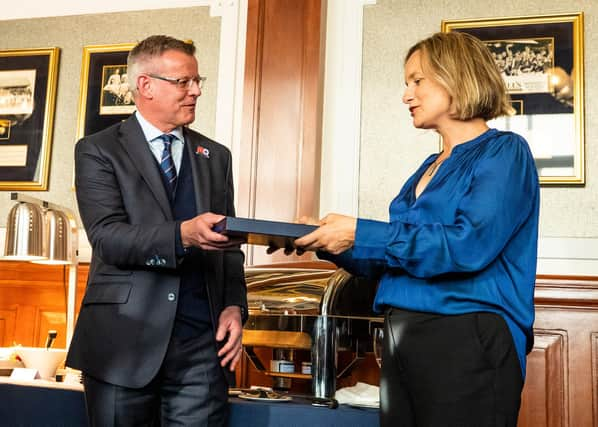Scientist traces her family roots to the original founders of Rangers


Growing up in Western Australia, Dr Emily Pidgeon was aware that one of her Scottish ancestors had been involved with a football team in Scotland. As she got older and moved to study in California, family heritage became increasingly important to her.
Last weekend, she learnt much more about the significance of her great, grand uncle in the history of Rangers Football Club. From club historian David Mason, she also found an even closer contact to the early years of the team.
Advertisement
Hide AdAdvertisement
Hide AdPeter Campbell, from Garelochhead, was one of the legions of Highlanders who came down to Glasgow seeking work but it was his love of the relatively new game of Association Football that would ensure his name will be forever enshrined in the history of the club.
Along with two brothers from Argyll, Peter and Moses McNeil, and William McBeath from Callander, Campbell is now immortalised as one of the four players who formed Rangers Football Club in 1872.
The story of the “gallant pioneers” will be one of the key attractions in a new museum Rangers are planning at Ibrox to coincide with the 150th anniversary of the club next year, funded by a special Museum Lotto.
David Mason, who has researched the lives of the famous four, was on hand to tell her the family story.
Advertisement
Hide AdAdvertisement
Hide AdAt 15, Peter Campbell was the youngest of the four and was considered to be one of the most skilful players of his era. Match reports from the time describe him “as the most poetic of dribblers, as graceful as a sylph”.
Along with Moses McNeil, he played for a Glasgow Select in 1876 against Sheffield and two years later represented his country in two matches against Wales, scoring in both games.
The medal he picked up when Rangers won their first ever trophy, the Glasgow Merchants Charity Cup, against Vale of Leven in 1879, is still on display in the Blue Room at Ibrox.
Amazingly, this medal was found in a public park in East Kilbride in 1968. For Dr Pidgeon, this was a real, physical link to her family back in the late 19th century.
Advertisement
Hide AdAdvertisement
Hide AdDespite his talent with a ball at his feet, Campbell had to have a paying job and, like so many other Highlanders, he was drawn to the sea to make a living.
Sadly, the sea also claimed his life when the ship he was on, the Saint Columba, went down with all hands in the Bay of Biscay in early 1883.
Dr Pidgeon was thrilled by a new part of the story that David Mason had uncovered in his more recent research. Her own great grandfather, James Jenkins Campbell, had also played several times for Rangers, including a match against Notts Forest in 1878.
In the Blue Room, Dr Pidgeon was presented with a “legacy strip” by the managing d irector of Rangers, Stewart Robertson. The strips have been produced as part of the 150th anniversary celebrations and all have been inscribed with the name of one of the four founders.
Advertisement
Hide AdAdvertisement
Hide AdUnsurprisingly, the name of Peter Campbell is embroidered into the collar of the shirt that Dr Pidgeon will take back home.
She told me it was “an emotional experience and a phenomenal privilege” to visit Ibrox and to watch the club her ancestors had founded and played for.
I suspect the story of Peter and JJ Campbell and the visit to the famous stadium will be told many times around the Pidgeon dinner table in Half Moon Bay near San Francisco.
(Cluinnear Iain Moireasdan air Spòrs na Seachdain gach madainn Disathairne air Radio nan Gàidheal)